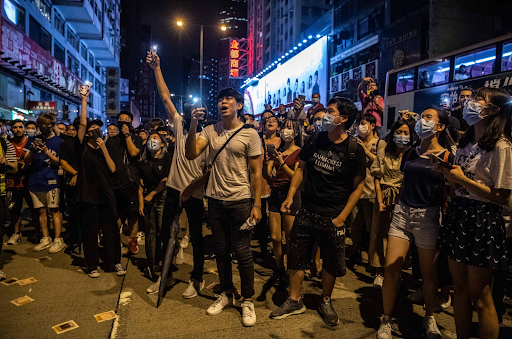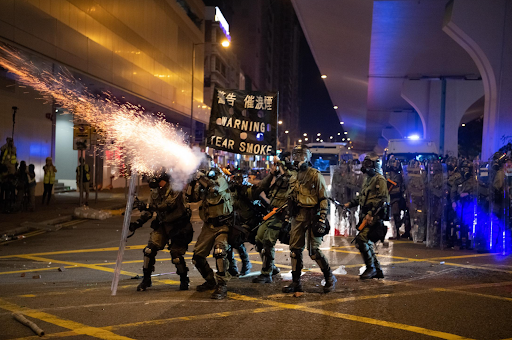In 2019, over a million Hong Kongers were unafraid to speak out against growing Chinese influence over Hong Kong. Now, with China’s imposition of the 2024 National Security Law, protests have died, and many former activists have either fled Hong Kong or have lost hope about the future.
The 2024 law further criminalizes anti-China speech and assembly and prosecutes retroactive crimes. It is a continuation of the oppressive response to the 2019-2020 protests that led to thousands of arrests. In May 2024, fourteen pro-democracy activists were found guilty of subverting the government under the new law.
“It’s quite dangerous. This is a restriction of our freedom. I feel this is no longer the 2019 Hong Kong I was living in,” said Mei Chan, a Hong Kong teenager, who only agreed to be identified by a pseudonym because of fears for her safety.
The protests began when in March 2019, a controversial bill was proposed by the Hong Kong government. It called for the extradition of alleged political criminals from Hong Kong to China. Due to the massive amounts of public demonstrations, the bill was withdrawn in October 2019, but protests did not end.
Tom Cheng and Hua Lee, the latter a pseudonym, former Hong Kong secondary school teachers, had students who were arrested during the 2019-2020 protests and sent to youth prisons. Both teachers are now living in the United States.
Lee began to question her identity as a Hong Konger during the protests, something her family has done for generations. During the Cultural Revolution, Lee’s mother swam across the river from China when she was 11 to reach Hong Kong.
“What is the purpose of education if there is no freedom to learn critical thinking or freedom to be able to speak up about what you believe? I think 2019 was a year of reckoning for many people, and for me, it definitely has changed me to my core,” said Lee.

The COVID-19 pandemic interrupted the protests, and China used this to its advantage. In June 2020, China introduced a law that stripped Hong Kongers of many of their civil liberties. It breached the 50-year agreement made between China and the United Kingdom that aimed to preserve Hong Kong’s legal and economic systems.
“It was said that we have 50 years of not changing any common law in Hong Kong following British rule, but in fact, is it not changing? Most of it has been changed with the National Security Law and other kinds of laws. It has changed already,” said Chan.
In March 2024, British Foreign Secretary David Cameron criticized China’s erosion of Hong Kongers’ civil liberties. The United Kingdom then relaxed visa rules for Hong Kongers due to the 2024 law.
Many Hong Kongers who were not apprehended during the 2019-2020 protests have fled the country in fear for their lives. Some, including Lee, try to stay active from abroad. Lee works for a human rights advocacy group and often brings up Hong Kong as a case study in her research.
“I continue to be quite vocal in speaking my mind in relation to Hong Kong, so I don’t necessarily feel safe to go back at this moment,” said Lee.
Cheng recounted the chilling effect of the 2024 law not just for citizens, but within governmental opposition. “There have been huge changes in the legislative council. Before, 60% of the elected politicians were pro-democratic, and 40% were pro-Beijing… with the establishment of national security law, a lot of those pro-democratic politicians are in jail. Right now, 59 out of 60 are pro-China.”
Hong Kongers have also been trying to commemorate anniversaries of events such as the 1989 Tiananmen Square massacre, but with little success.
Chan described the dangers of trying to remember such events publicly. To commemorate the 1989 Tiananmen Square Massacre, Hong Kongers go to Victoria’s Park, but police wait at the location and take the ID cards of those who gather there. “We cannot do it physically, only online,” she said. To stop the memorialization of the 35th anniversary of the 1989 massacre China sent police vehicles to arrest protesters.
Throughout 2019 and 2020, protesters committed suicide as a way to send a message to the Chinese government in Beijing. One of the first suicides was a man named Marco Leung. China tried to hide these reports or declare them as accidents.

“I think Hong Kong people know the truth,” said Lee. “There is a very iconic picture of [Leung] wearing a yellow raincoat. He unfurled a banner from an elevated podium on Pacific Place, which is a mall. He jumped. To this day, I think five years later, people still go to the mall to put down flowers to commemorate him… Hong Kong people are willing to go to that extent to speak up for what they believe in.”
Cheng, Chan, and Lee all noted the lack of street protests following the 2024 law. Chan attributed this to mass migrations and fear. “People are not coming out again because to be honest, many people left, or because they are afraid of being caught. I have a few friends of mine who are in prison because of this.”
Chan’s friends believed that they had the freedom of assembly, but in reality, they did not. Many who gathered against the government found themselves finding prison sentences of 18 months or more.
Despite protests not being as large-scale as in 2019 and 2020, Lee claims that minor forms of resistance still exist. Hong Kongers have used memes and humor pages to disseminate subtle protest messages. “Hong Kong people are very creative and there is a lot of what I perceive as soft resistance. I think that those may not be as well documented in terms of major news outlets – definitely not on the front page of the New York Times – but because I still keep in touch with a lot of Hong Kong people and the younger generation, I think there is still a lot of political will.”
Chan sees a bleak future for Hong Kong. “There is nothing we can do now. The only thing I hope is that we don’t forget what happened. Because people do forget, I can see: what we promised and what we said during that time. People are leaving, or they are afraid of going out and talking about it again, but I hope they won’t forget what happened those years.”
Lee hopes that she will one day be able to return to Hong Kong without fear. “In terms of the future, I think of Hong Kong as my home, so I would definitely love to return one day if the political situation changes. I don’t know when that will be or if I will be alive for that moment to come, but I hope that that day will come.”

